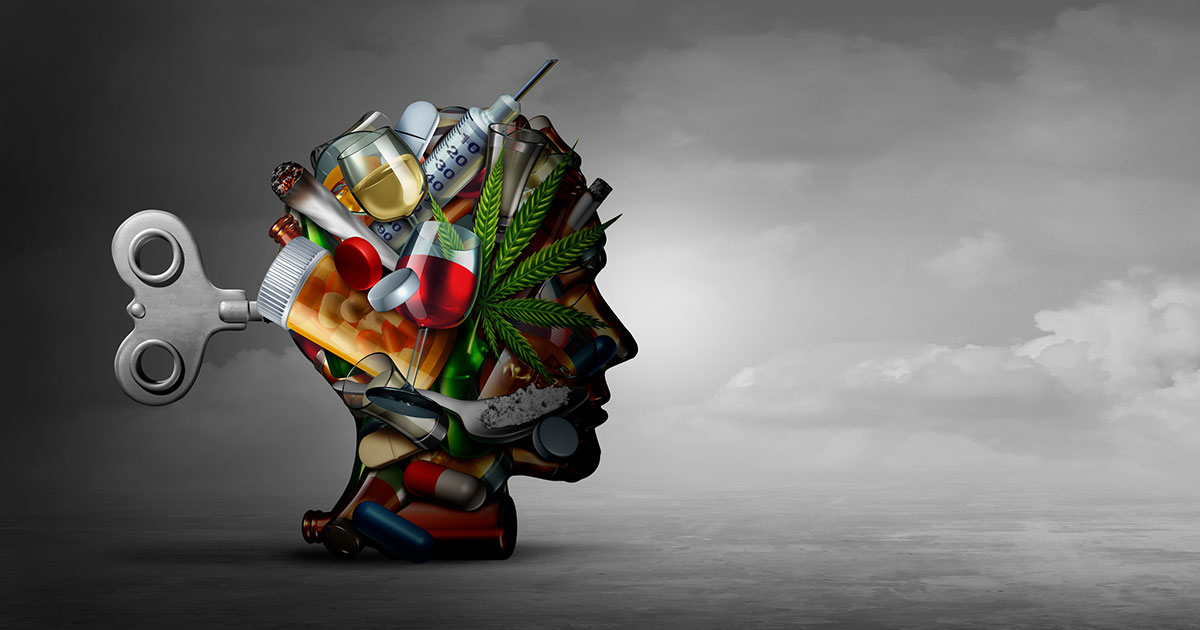About half of people who experience a mental illness will also experience a substance use disorder at some point in their lives and vice versa.1,2 When someone experiences a mental illness and a substance use disorder simultaneously, is it is referred to as a dual diagnosis – or comorbidity. Although it is difficult to determine which came first or why, research suggests three possibilities for this common co-occurrence:3
1. Certain risk factors can contribute to both mental illness and substance use disorders. Specific genes can make a person at increased risk of mental illness and can also influence how a person responds to a drug, including whether or not using the drug makes them feel good.3 Environmental factors, such as stress or trauma, can cause genetic changes that may contribute to the development of mental illnesses or a substance use disorder.3
2. Mental illnesses can contribute to drug use and substance use disorders. The most common issue connecting mental illness and substance abuse is the intention of a person to self-medicate the mental health symptoms they find disruptive or uncomfortable by using alcohol and drugs.3 Examples of self-medication include using marijuana to numb the pain of depression, drinking alcohol to feel less anxious in social situations, taking benzodiazepines like Xanax to calm the symptoms of a panic attack, or taking cocaine or crystal meth to help increase the drive to get things done.3 While the person may feel temporary relief, this type of self-medication ultimately makes the symptoms worse. Additionally, when a person develops a mental illness, brain changes may enhance the rewarding effects of substances, predisposing the person to continue using the substance.4

3. Substance use and addiction may change the brain in ways that make a person more likely to develop a mental illness.3
Because many combinations of dual diagnosis can occur, the symptoms vary widely. Symptoms of substance use disorder may include:5
- Withdrawal from friends and family
- Sudden changes in behavior
- Using substances under dangerous conditions
- Engaging in risky behaviors
- Loss of control over use of substances
- Developing a high tolerance and withdrawal symptoms
- Feeling like you need a drug to be able to function
Symptoms of a mental health condition can also vary greatly. Warnings signs, such as extreme mood changes, confused thinking or problems concentrating, avoiding friends and social activities and thoughts of suicide, may be reason to seek help.5
The high rate of dual diagnosis between substance use disorders and other mental illnesses calls for a comprehensive approach that identifies, evaluates, and treats both disorders together, rather than one or the other.5 Several behavioral therapies have shown potential for treating individuals with dual diagnosis. These approaches can be tailored to patients according to age, the specific drug misused, the type of mental health illness, and other factors.5 They can be used alone or in combinations with medications. Some effective behavioral therapies for treatment include.3,5

- Detoxification in an inpatient setting for initial sobriety and safety
- Inpatient rehabilitation therapy for 24/7 mental health care
- Cognitive behavioral therapy to help change harmful beliefs and behaviors
- Dialectical behavioral therapy to reduce self-harm behaviors, including suicide attempts or thoughts, cutting, and drug use
- Assertive community treatment to emphasize outreach to the community and an individualized approach to treatment
- Therapeutic communities, a common form of long-term residential treatment, to focus on the “re-socialization of the person
- Contingency management, which gives rewards to people who practice healthy behaviors
Effective medications exist for treating opioid, alcohol, and nicotine addiction and for alleviating the symptoms of other mental disorders.3 Some medications may benefit multiple problems. For example, bupropion is approved for treating both depression and nicotine dependence3.
If you have concerns about mental illness, substance use, or possible dual diagnosis, or if you would like more information about these disorders, contact your healthcare provider to schedule an appointment. Effective behavioral treatments and medications exist to treat these serious conditions that may have devastating effects on the overall health and quality of life of individuals.
©2022HealthSpot References: (1.) Ross S, Peselow E. Co-occurring psychotic and addictive disorders: neurobiology and diagnosis. Clinical Neuropharmacology. 2012;35(5):235-243. doi:10.1097/WNF.0b013e318261e193; (2.) Kelly TM, Daley DC. Integrated Treatment of Substance Use and Psychiatric Disorders. Social Work Public Health. 2013;28(0):388-406. doi:10.1080/19371918.2013.774673; (3.) National Institute on Drug Abuse. August 2018. Comorbidity: Substance Use Disorders and Other Mental Illnesses. Retrieved from https://www.drugabuse.gov/publications/drugfacts/comorbidity-substance-use-disorders-other-mental-illnesses; (4.) Santucci K. Psychiatric disease and drug abuse. Curr Opin Pediatr. 2012;24(2):233-237. doi:10.1097/MOP.0b013e3283504fbf; (5.) National Alliance of Mental Health. 2017. Dual Diagnosis. Retrieved from https://www.nami.org/learn-more/mental-health-. conditions/related-conditions/dual-diagnosis.

